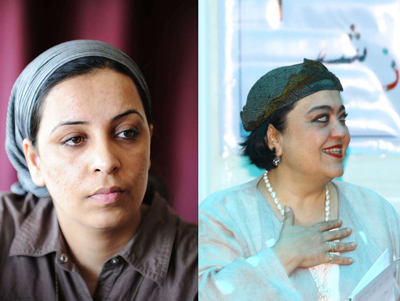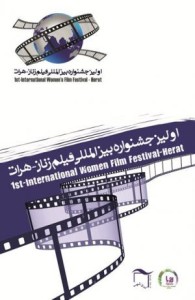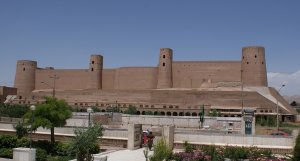FIDH
Update 5 March 2013
Launch of the Herat International Women’s Film Festival: International solidarity with the women of Afghanistan. On the eve of International Women’s Day, FIDH supports the first-ever International Women’s Film Festival in Afghanistan, which will take place from 7 to 9 March in Herat.
The festival was initiated by Armanshahr Foundation and Roya Film House, with the support of 40 human rights and women’s organizations and media partners. It will be held at the Herat Citadel, also known as the Citadel of Alexander, in North-East Afghanistan.
“The cinema is a powerful medium to raise awareness on problems people face on a daily basis, sometimes without seeing them. This festival, organized in a context full of risks and challenges for women, heralds a breakthrough in today’s Afghanistan”, stated Guissou Jahangiri, Executive Director of Armanshahr Foundation, FIDH’s member organization in Afghanistan.
“The Herat International Women’s Film Festival will be a unique occasion to highlight the vitality of Afghan civil society and express international solidarity with the plight of Afghan women in a country that remains torn by conflict. Afghan women are not only victims; they are also actors and contribute to promoting peace and tolerance in Afghanistan,” concluded Souhayr Belhassen, FIDH President.

Co-Presidents of the Herat International Women’s Film Festival: Roya Sadat, Director of Roya Film House and Guissou Jahangiri, Executive Director of Armanshahr Foundation/OPEN ASIA
In the post-Taliban era, despite the establishment of new bodies for the protection of women’s rights, women have continued to endure grave violations; violence against women and girls has remained widespread. FIDH and Armanshahr Foundation reiterate their calls to the international community to strengthen support to the future of Afghanistan and call on the Government of Afghanistan to:
Ensure that acts of violence against women are effectively investigated and prosecuted in accordance with international obligations.
Abolish laws that discriminate against women and bring laws into conformity with international obligations.
Strengthen the formal justice system, including by ensuring effective participation of women in the judiciary, and their effective protection necessary to ensure the free and independent exercise of their function.
Ensure that women’s rights are not used as bargaining chips in peace negotiations with the Taliban and other stakeholders.
SEE BILINGUAL FESTIVAL PROGRAMME HERE: flyer_fest_film_herat
Three questions to Guissou Jahangiri, Executive Director of Armanshahr Foundation
FIDH: What has been the response from film directors to your initiative?
G.J: The Festival’s Secretariat received about 100 films from national and international film directors, in particular women film-makers. Many of them will be screened during the Festival. Members of the Advisory Team include internationally renowned Afghan film makers such as Seddiq Barmak (Cannes Film Festival and Golden Globe award-winner for the film Osama). Paris-based writer, Atiq Rahimi, whose new film Sangue-e sabour (Patience stone) is currently being screened, has also supported the initiative.
This year, the Herat-International Film Festival will not be a competitive event, but will provide a platform and space to discuss issues concerning women, in the belief that the participation of dedicated women filmmakers will contribute to changing the perception of women’s roles in a traditional and war-torn society. Aside from the screening of the selected films, the Festival will also provide opportunities for roundtable discussions and critiques of the films, educational workshops for film-makers, as well as sightseeing tour of historical sites of Herat.
FIDH: What has been the involvement of Afghan civil society?
G.J: Armanshahr Foundation and Roya Film House have mobilised in-country assistance and have not received any international funding for the festival. In-kind support and solidarity from numerous local NGOs and institutions have also been mobilized. Governmental bodies such as the Afghan Ministry of Information and Culture, the Provincial Council of Herat and the Afghanistan Independent Human Rights Commission have supported the initiative. In addition, other regional festivals (9th IAWRT Asian Women’s Film Festival-India, the DIDOR Tajikistan International Film Festival, the Short Film News-Asia-Iran) and film production entities (Afghan Film, Barmak Film) have supported the Festival as a proof of their solidarity with Afghan women and the 7th art. The most popular television station in Afghanistan TOLO TV, 8 Sobh Daily Newspaper, the Amsterdam-based Radio Zamaneh and the Persian language BBC service will be covering the event.
FIDH: What is the future of such a festival given the instability in Afghanistan?
G.J: The festival is scheduled to be held every year, on the occasion of 8th March, International Women’s Day, with a view to exposing communities to diverse ideas and creating a forum for peaceful exchanges, both inside the country and regionally. In future years, we could imagine holding the Festival in neighbouring countries if, to our regret, lack of security obliges us to do so.
Presentation : First international Women film Festival – Herat Afghanistan



